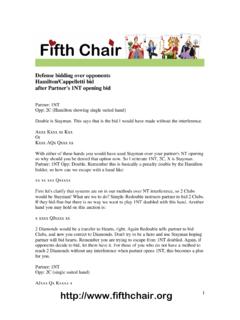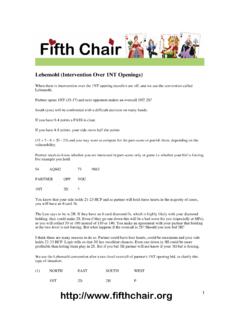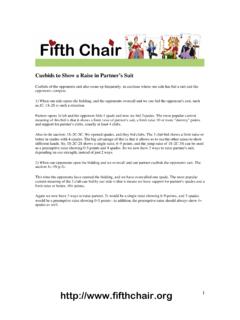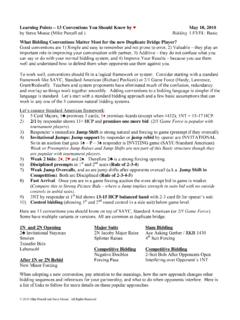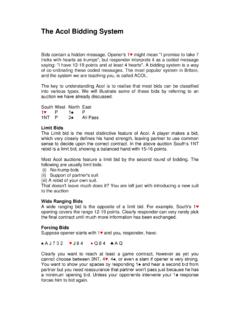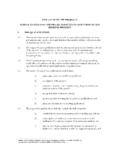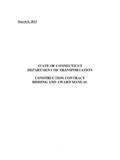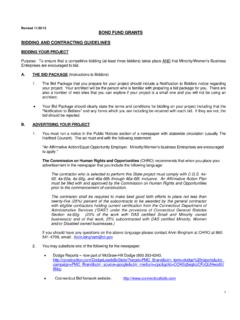Transcription of Bidding Against Preempts - fifthChair
1 1 Bidding Against Preempts By Mike Lawrence The topic for this class is the most frustrating that I've ever offered. You are sitting there happily admiring your very nice hand when your RHO starts to think. Something is coming and sure enough, your RHO announces that he is about to make a skip bid (preemptive bid). And sure enough, "Two Spades" he bids, or if it's a really bad day he bids "Three Spades" or something higher. Not nice. This lecture is to give you some insights on what you can do. WARNING I can tell you one thing. No one will always do the right thing after a preempt. Bridge is tough enough to play when your opponents are silent. When they preempt it is tougher yet. The materials I'm about to give you will be a big help, but you have to take it to heart that you and your partner are going to do the wrong thing all too often to suit you. Let me show you how bad life can bee when a preempt catches you off guard. Sooner or later you will experience a hand like this one: S Q8 H AJ D AKJ3 C KJ873 You sense your RHO is winding up to do something.
2 Sure enough, he bids 3S. No problem you think, I have nineteen points. Surely I have nothing to worry about. Do you know what to bid? I don't. Give this hand to your friends and they'll say things like: "Disgusting", "There is no answer", "Where did you get this problem?". Me? I hate making a takeout double without proper support for the other major, I can't bid no trump without a spade stopper, and Bidding 4C on a lousy suit scares me. Let's just say that this is an impossible hand to bid, give the opponents credit for finding the perfect moment for their preempt, and move on to some easier hands. There is one truth that you will learn from this discussion that you already know, but which you may not have acknowledged. 2 Bidding Against Preempts IS A DRAG If you agree that Bidding Against Preempts is a pain, the hand above being a good example of that, then I can give you a marvelous piece of advice that you should glom onto with YOU SHOULD PREEMPT MORE OFTEN YOURSELF If their Preempts are annoying you, why, I ask, should your Preempts not be annoying to them?
3 I am not going to suggest that you go to this extreme, but I can tell you of a player who has won many important National Championships opening hands like this one: S 109764 H A7 D 653 C 763 This "unnamed" player opened this thing with 2S. Yes, he did. Got away with it too. The amazing thing about this hand was that he did it Against two *many-time world champions*. Now that we know what we are up Against , let's see what we can do to make things more equitable. Just keep in mind that it will be IMPOSSIBLE to be perfect. Here are some tools to help deal with Preempts . THE RULE OF SEVEN THE TAKEOUT DOUBLE THE OVERCALL THE JUMP OVERCALL THE CUEBID I am going to discuss these topics during the quiz section that follows. I do wish to discuss the Rule of Seven first, however, as it is different from the other items on the list. It will help your Bidding judgment in a way that you will definitely appreciate. The Rule of Seven is not so much a rule as it is a guideline.
4 When an opponent opens with a preempt, you have to have a bid at the three or four level, a far cry from the normal overcalls at the one or two level. The Rule of Seven is a guideline that tells you what you are entitled to wish for in your partner's hand. Say that your RHO opens two hearts in first seat. What do you need to have to bid two spades? Or three clubs? Or double? The Rule of Seven says you are entitled to hope for seven ORDINARY high card points in your partner's hand. Say you are thinking of Bidding two spades. You can wish for partner to have something like this hand: S 87 H J874 D A932 C Q105 This hand has nothing special. It has seven high card points, some more useful than others. It does not have a wonderful shape and it does not have wonderful trumps. 3 An optimist would wish for his dummy to have a magic hand like this one: S 10873 H 2 D A876 C K1094 This is not the kind of seven point hand that you can wish for. If you need your partner to have this fine hand to make it safe for you to bid two spades, then you should not be Bidding .
5 Here is another way of looking at the Rule of Seven. If you play at the two level in a suit, you need 22-23 points, counting shape. If you play at the three level, you need 23-24 points, counting shape. If you play at the four level, you need 24-26 points, counting shape. When a decision is put on you, add your values to what partner rates to have, note how high you have to bid, and see if your partnership has enough points to warrant Bidding . I remind you that this is not infallible. If your partner has nothing for you, you go down. HOW SHOULD YOU BID WHEN YOUR PARTNER BIDS OR DOUBLES? If your partner makes a takeout double or makes an overcall, you should view a seven point hand as being expected. Say your LHO opens 2D and your partner bids 2H and RHO passes. What should your reaction be with these three hands? NO ONE VULNERABLE: 2D 2H PASS ? HAND ONE S Q8763 H 62 D Q72 C 1094 HAND TWO S 873 H J43 D J3 C KQ763 HAND THREE S A7543 H 1094 D A7 C J104 Here is what you should be thinking on these three hands: Hand one has less than the seven points that you expected.
6 You partner will be quiet unless forced to bid. Hand two does have seven HCP and it does have modest support, but it is more or less what your partner thinks you have according to the Rule of Seven. This hand is not good enough to bid with, but two hearts should make. Hand three has more than the Rule of Seven suggests. With this hand your partner owes you a bid. Raising to three hearts seems about right. If your partner has another point or two, he should raise you to game. In the quiz hands starting below I will discuss further ways the Rule of Seven can be applied, as well as examples of the other themes I mentioned above. BOTH VULNERABLE: RHO BIDS 2H. YOUR CALL? S K1084 H 83 D AJ8 C AQ98 Not a hard hand. The Rule of Seven says that you can count on your partner to have seven modest points. You have about fifteen so ought to be safe in Bidding . Double is the bid because you have no suit to bid, and you do have takeout shape. That was an easy question.
7 Here is a harder one. Say your hand had only three spades and one more diamond. Would you still double two hearts? 4 Here is the same hand with one less spade: S K108 H 83 D AJ87 C AQ98 The answer is a strong yes. You should double two hearts. It is true that your partner may bid spades and end up in a bad contract, but it DOES NOT HAVE TO happen unless you are one of the truly unlucky bidders in the world. Here is a guarantee. If you hear your RHO opponent open with two hearts and you do not contest with a double, you will miss out on many hands. Look at the good things that can happen. Your partner may have a five card spade suit. He may have four good ones. He may bid clubs, or diamonds or no trump. Perhaps, if the opponents compete, your partner can double them. At the least, your side may be able to push them one trick too high. Look for reasons to bid, not reasons to pass. Be OPTIMISTIC if you have any excuse to do so. NO ONE VULNERABLE: RHO BIDS 2H.
8 YOUR CALL? S KJ1042 H 532 D A8 C AK9 Bid two spades. This is a fairly good hand, but one that needs a fit or some high cards from your partner to make game. If your partner has an ordinary seven points, you will probably make two spades and don't rate to make much more. If your partner has nine or more points, he will bid if he has a fit and you will go one. One thing you should NOT do with this hand is double. Your partner will bid a minor suit much of the time and that will leave you to wonder whether to bid spades at the three level. Seldom will you double when you have a good five card suit to show. NO ONE VULNERABLE RHO BIDS 2D. YOUR CALL? S KQ763 H Q8 D Q43 C K52 Hands like this one try your will power. You would bid one spade after an opening one diamond bid, but Against a two diamonds you should pass. The Rule of Seven tells you this, as well as good judgment. Your hand is supposed to be worth twelve points plus one for shape, but that is optimistic.
9 Even if you count this hand as being worth twelve points, the Rule of Seven says you have less than twenty points which is not enough to make two spades. There is a hidden danger to Bidding two spades that you should be aware of. Let's take a short trip to the other side of the table. What does your partner expect from you? What should he do when he has a good hand with spade support? Should he try to guess that you have a real overcall or do you want him to infer that you are stepping out of line? NORTH HAND: S AJ92 H A732 D 106 C Q94 SOUTH HAND: S KQ763 H Q8 D Q43 C K52 If these are the two hands, you have a potential to go down in three spades, let alone four. If I held the north hand I would raise to game and would be sad to see that it had no play at all. This hand should be easy 5 except for players who just can't stand to sit still. You have a hand that would be happy to bid one spade over one diamond, but here the Bidding is at the two level.
10 Just because your opponent has preempted does not mean it is safe to bid. Some of the biggest penalties come when someone unwisely bids Against a preemptive bid. Your judgment should warn you that Bidding with this hand is dangerous. Listen to it. Here is another hand. No one vulnerable. RHO bids 2S. What is your call? S K3 H 4 D A9873 C KJ874 The first question is whether to bid and if you decide the hand is worth a bid, the second question is what to bid. As to whether to bid. The Rule of Seven says you should pass. Competing for nine tricks requires in the vicinity of 23 points. You can trust (wish) that your partner has seven. Let's pretend that you have the same distribution, but had another ace to make the hand worth Bidding with. What should your bid be? Do I hear any votes for TWO NOTRUMP? I wish I had the ability in this format to have a show of hands. I bet that a number of players here would choose to bid two notrump, thinking they were showing the minor suits.
